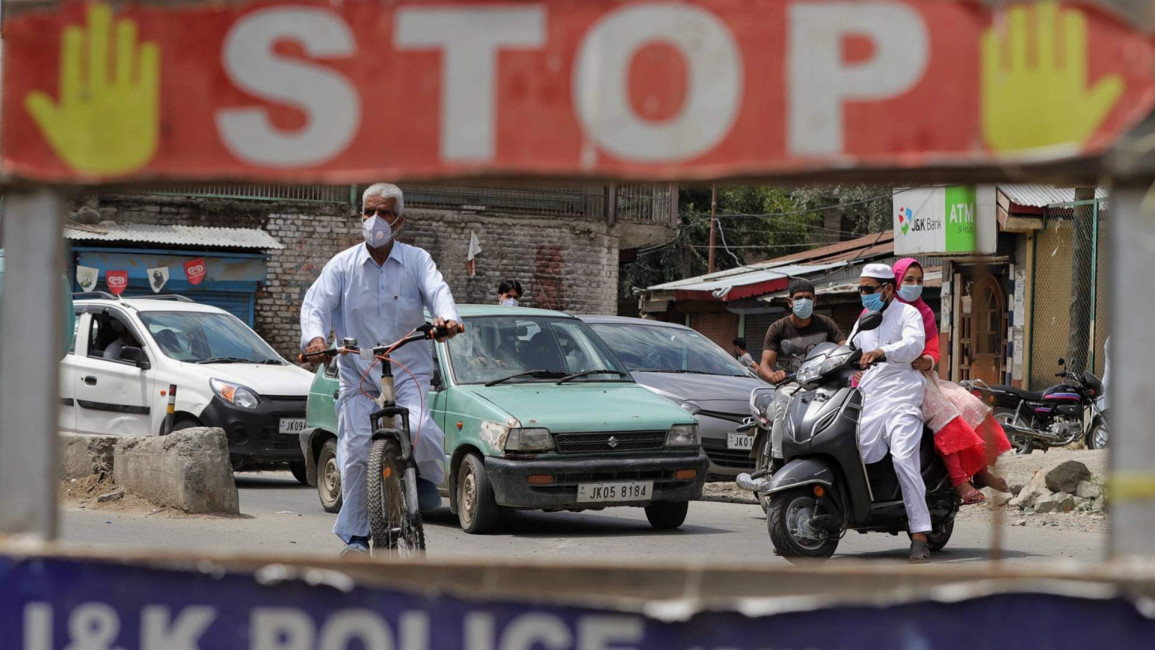Desperation, misery in Kashmir a year after Indian clampdown
Hundreds of thousands of jobs have been lost as the military-enforced measures – compounded by a second wave of restrictions related to the coronavirus pandemic - turned daily life in the Muslim-majority region into an obstacle course of razor-wire roadblocks.
Medical workers say the relentless restrictions have exacerbated a mental health crisis among Kashmiris, already scarred by decades of conflict, while the death toll from military operations against separatist fighters is heading for a 10-year high.
And as the first anniversary approached of the August 5 decision by Prime Minister Narendra Modi's Hindu nationalist government to strip Indian Kashmir of its semi-autonomous status, the pressure was renewed with a two-day curfew imposed across the entire region.
Police vehicles fitted with megaphones patrolled the city of Srinagar, with officers ordering residents to remain indoors.
The Himalayan territory is a long-running flashpoint between bitter nuclear-armed rivals India and Pakistan, which control parts of it but claim it in full.
Modi's move to strip Kashmir's special status was backed by a massive security operation that poured troops into city streets, imposed an internet blackout for months and saw the arrest of hundreds of politicians and activists.
 |
This lockdown is the most crushing shock I have known |  |
The impact on Kashmir’s already fragile economy was enormous, shuttering shops and small businesses that then took another hit as the coronavirus hit India hard and triggered a nationwide lockdown.
Nazir Ahmed Sheikh was one of the victims. He has not worked since losing his job as a bus conductor when the region's economy ground to a near-halt.
And despite Kashmir's long and brutal experience with conflict, the 50-year-old says it was never this bad.
"I have been through many curfews and shutdowns," Sheikh said.
"But this lockdown is the most crushing shock I have known."
|
|
Harris Dullo, who runs an outdoor advertising and branding business, said he is struggling to keep his 25 employees on the payroll by selling sanitisers and other coronavirus-related products.
"Uncertainty is increasing by the day and I might have to lay off my workers," he said.
"The bank interest burden is mounting and it will be difficult to cope."
Indian-administered Kashmir has reported more than 20,000 infections since March, with nearly 400 deaths. A spike in cases last month triggered another temporary lockdown.
The communications blackout has been eased only partially, and doctors in Kashmir say the restrictions are hurting efforts to counter the pandemic by impeding access to virus information shared online.
Indian authorities had promised stability and development last year when they stripped Kashmir of its semi-autonomous status, but analysts say there is little sign of progress or injection of resources to help the economy.
"Without investment... it is hard to see how the promise of development can be kept," said Ashutosh Varshney, a specialist on South Asian affairs and security at Brown University.
'Pushed to the wall'
Separatist militants launched a full-blown revolt against Indian rule in 1989, a conflict that has left tens of thousands dead, and prompted the deployment of hundreds of thousands of Indian troops.
The Modi government insists that the action last year was needed to halt the conflict, boost development and give justice to the minorities forced to leave Kashmir.
But many Kashmiris say they are being punished for their defiance of Indian rule and the broad support enjoyed by separatists who seek independence or a merger with Pakistan.
A civil society panel that visited the region said Monday that the people of Kashmir had "lost faith" in India's political leadership.
Nearly half of Kashmir adults suffer from some form of mental illness, according to surveys, and doctors - banned from speaking publicly - say the situation has worsened since August last year because of the crackdown and the virus lockdown.
Read more: India's new media policy tightens the noose on Kashmiri journalists
A psychiatrist at a government-run hospital in Srinagar said his team had seen an "exponential increase" in suicidal tendencies, panic attacks and post-traumatic stress disorder in recent months.
The military has intensified its counter-insurgency operations in recent months, and clashes in the first half of the year have left 229 dead, including 32 civilians.
The 283 people killed in all of 2019 was the highest toll for a decade.
Police have stopped handing over the bodies of slain militants to their families, burying them in remote areas to prevent funerals that are normally thronged by thousands.
"The shock of August 5 has still not dissipated," said Siddiq Wahid, a Kashmiri historian and political analyst.
"The Kashmiri people have been pushed to the wall and will not stay quiet indefinitely."
Follow us on Facebook, Twitter and Instagram to stay connected



